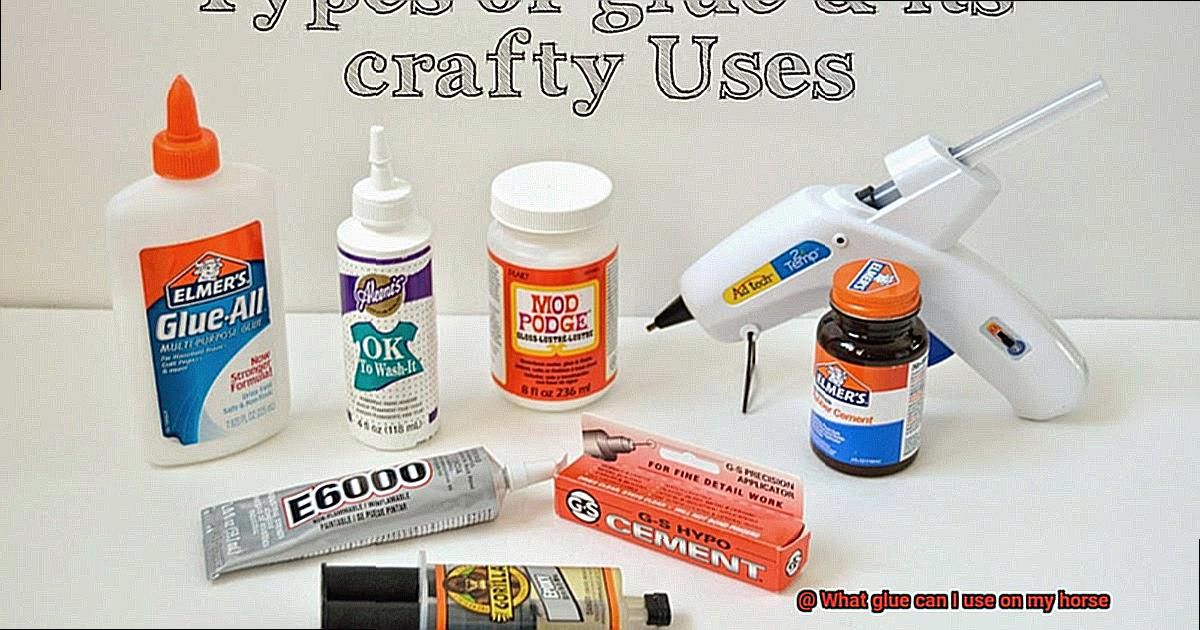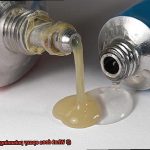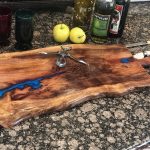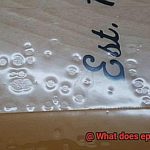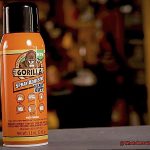As horse lovers, we always strive to find innovative ways to care for our four-legged friends. From maintaining their shiny coat to ensuring their hooves are in top shape, we’re constantly seeking new methods to enhance their well-being.
One such method that has been gaining popularity in recent years is the use of glue on horses. However, before you grab any old adhesive, it’s crucial to understand which type of glue is safe for your horse and its intended purpose.
In this blog post, we’ll delve into the various types of glue that are suitable for equine use and how they can be utilized. Whether it’s using glue to secure bandages or dressings onto wounds or applying hoof glue to keep your horse’s shoes firmly in place, there are several applications for this unique approach to caring for horses.
We’ll also address any potential risks or concerns associated with using glue on your horse so that you can make an informed decision about whether this method aligns with your equine partner’s needs.
Whether you’re a seasoned equestrian or a curious newcomer, read on to learn everything you need to know about using glue on your horse and how it can contribute towards keeping them healthy and happy for years to come.
Types of Glue Suitable for Horses
Contents
- 1 Types of Glue Suitable for Horses
- 2 Adhesives to Avoid on Horses
- 3 Safety Considerations for Applying Glue on Horses
- 4 Preparing the Horse Before Applying Glue
- 5 Tips for Applying Glue on Horses Safely and Effectively
- 6 How to Remove Excess or Old Glue from the Horse’s Skin
- 7 Potential Health Issues Related to Using the Wrong Type of Glue on Horses
- 8 Consulting with a Professional When in Doubt
- 9 Conclusion
Using glue on horses is a delicate matter, and choosing the right type of adhesive is crucial to avoid harm or injury. As an expert on the topic, I have compiled a list of the most commonly used types of glue suitable for use on horses, including cyanoacrylate glue, epoxy glue, silicone adhesive, polyurethane adhesive, and acrylic adhesive.
Cyanoacrylate glue, also known as superglue, is ideal for bonding small cuts and wounds on your horse’s skin. It dries quickly and forms a strong bond, preventing infections. However, it should only be used in small amounts and with caution to avoid contact with sensitive areas such as the eyes.
Epoxy glue is a two-part adhesive that can bond metal, wood, and plastic. It is strong and durable, making it ideal for repairing hooves or shoes. However, it should only be applied by a professional farrier to avoid causing more harm than good.
Silicone adhesive is a flexible adhesive that can bond materials that need to remain flexible, such as leather or rubber. It’s also great for sealing joints and gaps in equipment and tack.
Polyurethane adhesive is versatile and can bond a wide range of materials, including metal, wood, plastic, and rubber. It’s waterproof and heat-resistant, making it ideal for use in harsh environments.
Acrylic adhesive is another strong adhesive that can bond materials requiring a strong bond but need to remain flexible, such as leather or rubber. It’s also waterproof and heat-resistant.
When using any type of glue on your horse, it’s essential to follow the manufacturer’s instructions carefully and ensure that the glue is applied correctly. Always test the adhesive on a small area first to ensure that your horse isn’t allergic or sensitive to the product. Using hot glue or silicone-based adhesives should be avoided at all costs as they can cause severe burns or skin damage.
In conclusion, using the right type of glue and applying it carefully can help you safely use glue on your horse for a variety of purposes.
Cyanoacrylate Glue (Super Glue)
Before you go rushing to grab your tube of Super Glue, there are some important things you need to know.
Super Glue works by bonding to the skin and creating a seal over the wound, which helps prevent bleeding and infection. This adhesive dries quickly and can be easily applied with a small brush or applicator. It is often used in veterinary medicine for small cuts and wounds on horses.
Before applying Super Glue to a horse’s wound, it is crucial to clean the area thoroughly with an antiseptic solution. This will not only help to prevent infection but also ensure that the glue adheres properly to the skin.
It is important to note that Super Glue should only be used on small cuts and wounds. It is not suitable for larger injuries or deep wounds that require stitches or veterinary attention. Therefore, if your horse has a gaping wound or a large laceration, please seek professional help.
When using Super Glue on smaller cuts and wounds, use a small brush or applicator to carefully cover the wound and create a seal over it. Remember to use only a small amount of glue and avoid getting it in sensitive areas such as the eyes or mouth.
One thing to keep in mind is that Super Glue works by bonding to the skin, so it may cause some discomfort when removed. Therefore, it is best to let the glue wear off naturally rather than trying to peel it off.
In addition, while Super Glue may be a useful tool in emergency situations, it should always be used under the guidance of a veterinarian. They will be able to advise you on whether Super Glue is appropriate for your horse’s specific injury and provide you with further instructions.
Polyurethane Glue
Then consider using polyurethane glue, also known as Gorilla Glue. This powerful adhesive is made of a moisture-curing polymer that creates a strong bond on materials like wood, metal, and plastic. As an expert in this topic, I’m here to provide you with some tips and tricks on using polyurethane glue safely and effectively.
Firstly, it’s important to note that polyurethane glue should only be used on non-living materials like horseshoes or equipment. Applying it to living tissue or skin can cause irritation and harm to the horse. However, for non-living materials, polyurethane glue can be a game-changer. It’s commonly used in the equestrian world for attaching horseshoes to hooves, repairing halters or bridles, and fixing small cracks in hooves.
One potential drawback of polyurethane glue is its tendency to expand as it cures, making it challenging to control and apply in certain situations. Additionally, once it has bonded, it can be challenging to remove. Therefore, it’s crucial to use caution and apply carefully.
To use polyurethane glue safely and effectively, consult with a veterinarian or farrier before applying it to your horse’s equipment. They can advise you on whether this type of glue is the appropriate choice for your specific situation. Additionally, consider these tips:
- Apply a thin layer of glue evenly on the surface
- Use gloves to avoid getting the glue on your skin
- Allow ample time for the glue to dry and cure before using the equipment
- Use caution when applying near sensitive areas like the eyes or mouth
Adhesives to Avoid on Horses
Horses are graceful creatures that require special care, especially when it comes to their sensitive skin. As an expert, I cannot emphasize enough the importance of using the right adhesives on horses. Using the wrong glue can easily irritate or even injure their skin.
One type of adhesive that should be avoided when working with horses is cyanoacrylate glue, also known as super glue. Although cyanoacrylate glue is perfect for household repairs, it can cause a chemical burn on a horse’s skin, which can be painful and challenging to treat. Therefore, it is essential to avoid using this type of glue on horses at all times.
Another type of adhesive to steer clear of is any tape or adhesive bandage that contains latex. Horses can be allergic to latex, which can result in severe skin irritation or even anaphylactic shock in some cases. Always check the label of any adhesive product before using it on your horse to ensure that it does not contain latex.

It is also crucial to note that products designed for human use should never be used on horses. Products like hair extensions glue or eyelash glue are not formulated for animal use and can cause significant harm if used incorrectly. Always use products specifically designed for horses.
Epoxy
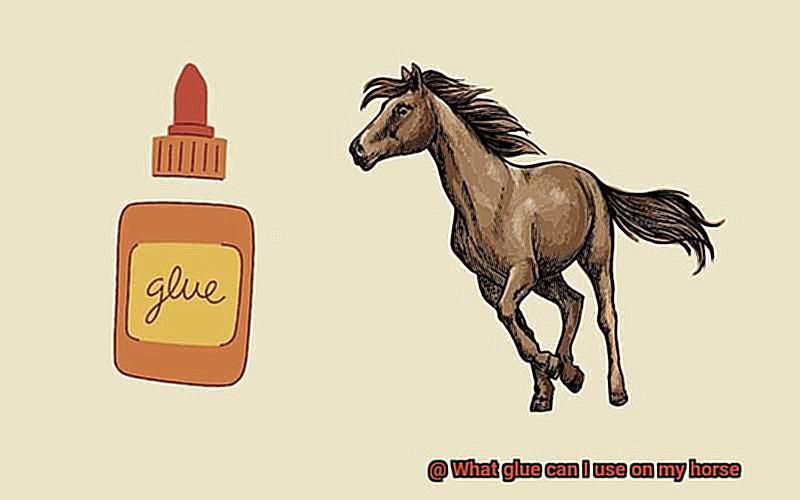
Accidents can happen, and when they do, it’s essential to have the right tools in your horse care kit. One such tool is epoxy, a popular adhesive known for its strength and durability. However, when it comes to using epoxy on horses, there are crucial factors to consider.
The first and most significant consideration is that epoxy should never be used on open wounds or areas where it may be ingested. Epoxy contains chemicals that can be harmful if absorbed into the bloodstream. It’s always best to consult with a veterinarian or equine specialist before using any adhesive on your horse. They can advise you on the best type of epoxy to use and how to apply it safely.
When using epoxy on horses, it’s crucial to ensure the area you’re working on is clean and dry before applying the adhesive. A roughened surface may also help the epoxy adhere better. Always follow product instructions carefully, and remember that a little goes a long way with this potent adhesive.
Silicone-Based Adhesives
Luckily, silicone-based adhesives have become a popular option for gluing items to your horse’s body. These adhesives have impressive bonding properties and flexibility, making them ideal for use on various materials such as leather, rubber, and metal.
Silicone-based adhesives are waterproof, meaning they can withstand exposure to sweat and water without losing their adhesive strength. So, you can rely on them to keep important gear like horseshoes or protective gear securely in place during exercise or competition.
Moreover, silicone-based adhesives have a low toxicity level, making them safe for use on animals. However, it’s crucial to use them with caution and avoid getting them in the horse’s eyes or mouth.
When using silicone-based adhesives on your horse, it’s vital to follow the manufacturer’s instructions carefully. This includes cleaning and drying the area where the adhesive will be applied and allowing it to set properly before using the item attached to it. You must also avoid using these adhesives on sensitive areas or open wounds on your horse’s body.
Safety Considerations for Applying Glue on Horses
When it comes to applying glue on horses, it is crucial to take the necessary precautions to avoid any potential harm to the animal. Let’s delve into the key safety considerations for using glue on horses.
Firstly, it’s essential to choose the right type of glue that’s specifically formulated for animal use and has undergone safety testing. Avoid using household or industrial glues as they may contain harmful chemicals that can cause burns, irritation, or serious injuries to your horse.
Before applying any glue, you must thoroughly clean and prepare the area where the glue will be used. This means removing any dirt, debris, or other substances that could interfere with the adhesive properties of the glue. It’s also important to check for any cuts, wounds, or injuries in the area as they can increase the risk of infection and may require special treatment.
During application, following the manufacturer’s instructions is crucial. This may involve using gloves or other protective equipment to prevent skin contact or eye exposure to the glue. Furthermore, it’s vital to avoid getting any glue in your horse’s eyes, nose, mouth, or ears as it can cause serious irritation or more severe injuries.
After applying the glue, observe your horse for any signs of discomfort or irritation. Itching, swelling, redness, or other symptoms could indicate an allergic reaction or an adverse response to the glue. In such a situation, seek veterinary care immediately to ensure proper treatment.
Preparing the Horse Before Applying Glue
Gluing your horse can be a quick fix, but it’s vital to take the necessary precautions to ensure that the process goes smoothly. In this post, I’ll be sharing some tips and tricks on how to prepare your horse before applying glue, so that both you and your equine partner can have a positive experience.
Firstly, grooming your horse thoroughly is crucial before applying any adhesive. Use a soft-bristled brush to remove any loose hair or debris from the area where the glue will be applied. This not only helps to keep your horse clean and comfortable but also ensures that the glue bond is strong and secure. After grooming, clean the area with a damp sponge or cloth to remove any remaining dirt or debris. It’s important to ensure that the area is completely dry before applying the glue since any moisture on the horse’s coat can cause the glue to bond poorly.
The next step is to ensure that your horse is comfortable and relaxed during the gluing process. Horses can become anxious or stressed when they are restrained or handled in unfamiliar ways, which can make it difficult to apply the glue correctly. Before gluing, spend some time calming and relaxing the horse, using gentle stroking or massage techniques to help it feel at ease.
In addition to preparing your horse physically, it’s also essential to prepare the environment in which the gluing will take place. Choose an area that is clean, dry, and well-lit, with enough space for both you and the horse to move comfortably. Make sure that there are no distractions or potential hazards in the area that could cause the horse to become nervous or agitated.
To summarize, here are some key steps to prepare your horse before gluing:
- Groom your horse thoroughly using a soft-bristled brush
- Clean the area with a damp sponge or cloth and ensure it’s completely dry
- Spend some time calming and relaxing the horse before gluing
- Choose a clean, dry, and well-lit area with enough space for both you and the horse
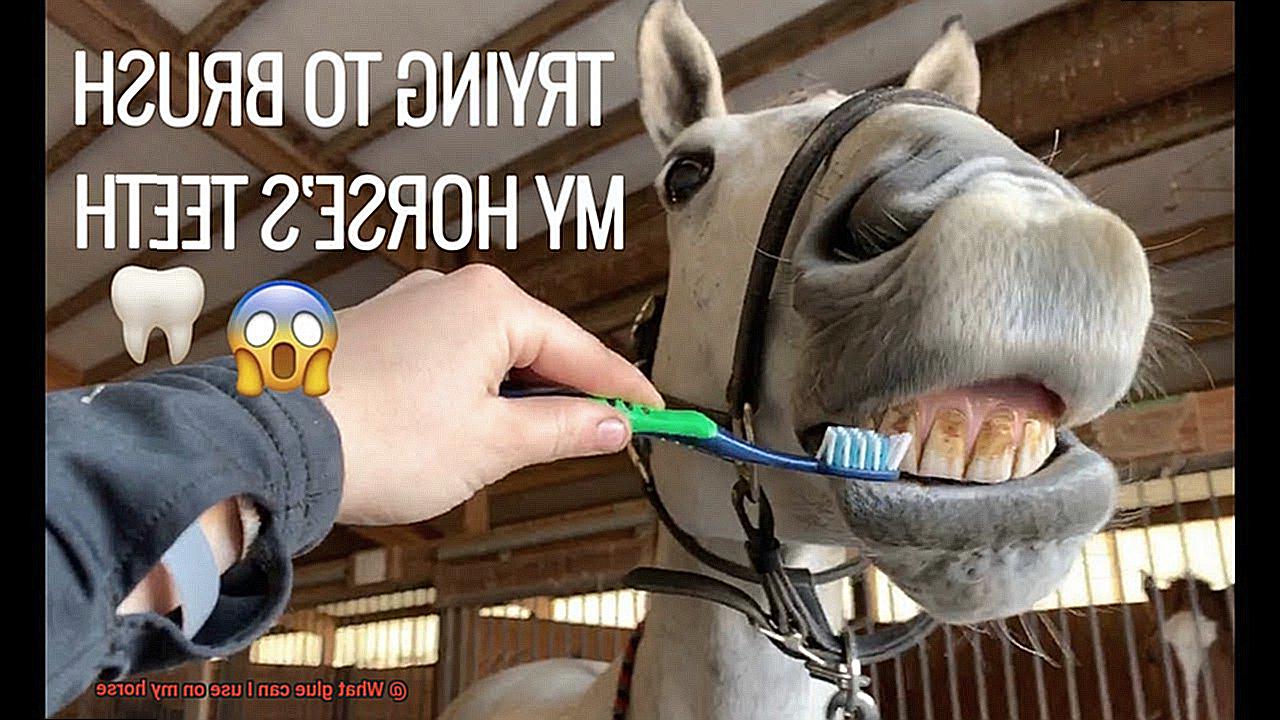
Tips for Applying Glue on Horses Safely and Effectively
Applying glue on horses can be a useful technique for treating wounds or bonding materials to their hooves. However, using glue improperly can cause harm and injury to your horse. Therefore, it’s crucial to prioritize safety and follow some tips to apply glue on horses safely and effectively.
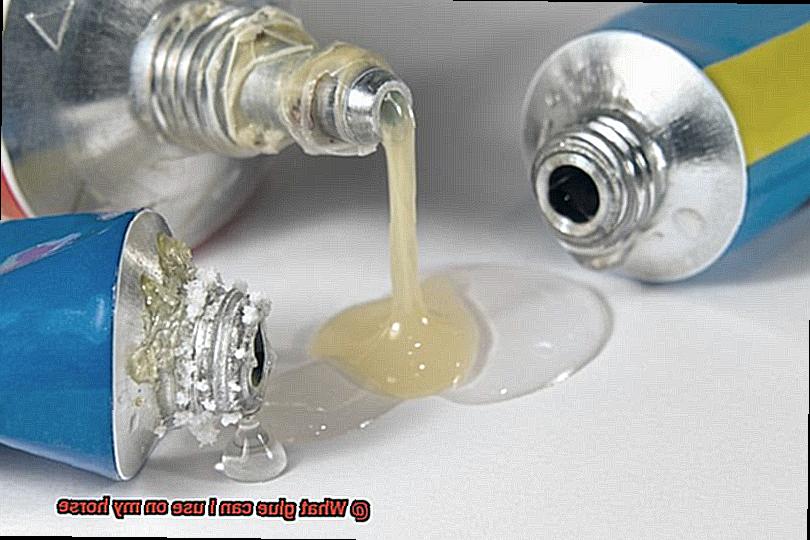
Choosing the right type of glue is the first and most crucial tip. Always use a glue specifically formulated for equine use, as not all adhesives are safe for horses. Some adhesives may contain harmful chemicals that can damage your horse’s skin or cause an allergic reaction. You can easily find horse-specific glue in most equestrian supply stores.
Preparing the area before applying glue is the next important tip. Ensure that your horse’s skin is clean and dry before application. Any dirt or moisture can interfere with the adhesive’s effectiveness and may cause skin irritation. You can clean the area where you intend to apply the glue using a gentle soap or shampoo and rinse thoroughly. Trimming the hair around the area where you will apply the glue can also ensure better adhesion.
It’s crucial to work in a well-ventilated area and wear appropriate protective gear when applying glue on horses. Glue can emit fumes that can be harmful if inhaled, so take proper precautions. Wear gloves to protect your hands from the glue and any chemicals it may contain. You may also want to wear a mask or respirator to avoid inhaling fumes.
Applying glue in small amounts is another critical tip. This will help ensure that you get an even coverage without using too much glue, which can be wasteful and messy. Be careful not to get any glue in your horse’s eyes or nostrils, as this can cause discomfort or irritation.
Lastly, if your horse shows any signs of discomfort or irritation after applying the glue, remove it immediately and seek veterinary attention. Horses are sensitive animals, and even a small amount of irritation can lead to significant discomfort or pain.
How to Remove Excess or Old Glue from the Horse’s Skin
Using glue on horses can be beneficial, but it is crucial to know how to remove excess or old glue from their skin to avoid discomfort or injury. Here are five safe and effective methods to remove glue residue from your horse’s skin:
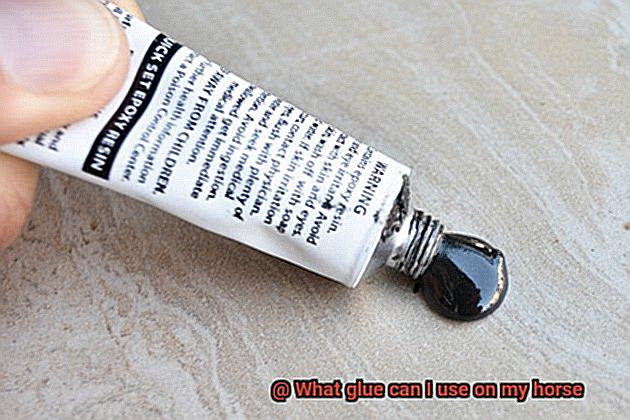
Use Warm Water and Soap
The first step is to dampen a soft cloth with warm water and gently rub the affected area in a circular motion. You may add a mild soap or shampoo to help break down the glue. Rinse thoroughly with clean water. Avoid rubbing too hard, as it can cause irritation or even abrasions on your horse’s skin.
Try a Commercial Adhesive Remover
Choose a product specifically designed for use on horses and follow the manufacturer’s instructions carefully. Make sure to select a safe and gentle product that won’t irritate your horse’s skin.
Be Careful with Stubborn Glue
If the glue has hardened, you can gently use a plastic scraper or spatula to remove it. However, be cautious not to scrape your horse’s skin too hard, as it can cause injury. If the glue is particularly stubborn, consult with a professional before attempting to remove it.
Avoid Harsh Chemicals
Some adhesive removers contain harsh chemicals that can irritate your horse’s skin, so choose a product that is safe and gentle.
Consult with a Professional
Before attempting to remove excess or old glue from your horse’s skin, always consult with your veterinarian or a professional horse groomer. They can provide guidance on the best methods and products to use based on your horse’s individual needs and skin sensitivity.
Potential Health Issues Related to Using the Wrong Type of Glue on Horses
Horses are majestic animals that require diligent care and attention. As responsible horse owners, we are responsible for ensuring their overall well-being, including the type of glue we use on them. Using the wrong type of glue on horses can have serious health implications that can cause discomfort and compromise their overall health. Here are some potential health issues related to using the wrong type of glue on horses:
- Skin irritation: Horses have delicate skin, and using a glue that is not specifically formulated for equine use can cause skin irritation. This can range from mild redness and itching to more severe reactions such as swelling and blistering.
- Allergic reactions: Horses can develop allergies to certain substances just like humans. Using the wrong type of glue can trigger an allergic reaction that can cause discomfort and even respiratory distress.
- Chemical burns: Some types of glue, such as cyanoacrylate glue, can cause chemical burns if used incorrectly or if left on the skin for too long. This can be incredibly painful for the horse and may require veterinary intervention to treat.
To avoid these potential health issues, it is crucial to use only glue that has been specifically designed for use on horses. Equine-specific adhesives are formulated to be gentle on the horse’s skin and will not cause any adverse reactions or health problems. Always read the label carefully before using any type of equine adhesive and follow the manufacturer’s instructions for application and removal.
Avoid using cyanoacrylate glue, also known as superglue, which dries quickly and has strong adhesive properties, making it unsuitable for use on horses. Epoxy glue, a two-part adhesive consisting of a resin and hardener, is another type of glue that should not be used on horses’ skin due to its potential to cause severe skin reactions.
Consulting with a Professional When in Doubt
We carefully select their feed, exercise routine, and living conditions, but when it comes to using glue on them, we may not know which product is safe and appropriate. This is where consulting with a professional when in doubt becomes crucial.
There are a few reasons why seeking advice from a veterinarian or an experienced equine professional is important before using any glue on your horse. Firstly, using the wrong type of glue can have severe health implications for your horse. Toxic chemicals in some glues can cause skin irritation, respiratory problems, and even poisoning. By consulting with a professional, you can rest assured that you’re using safe and appropriate glue.
Moreover, a professional can also guide you on proper application methods to prevent any accidental injury or discomfort to your horse. Applying glue incorrectly can lead to discomfort or even injuries that may be irreversible. Seeking guidance from a professional can prevent any mishaps during the application process.
WXflifrKWFg” >
Conclusion
In conclusion, it is important to note that gluing anything onto a horse is not recommended.
Horses have sensitive skin and can react negatively to certain adhesives. If you absolutely must use glue for medical or cosmetic purposes, consult with a veterinarian or equine professional first.
They can recommend safe and appropriate products that won’t harm your horse.

